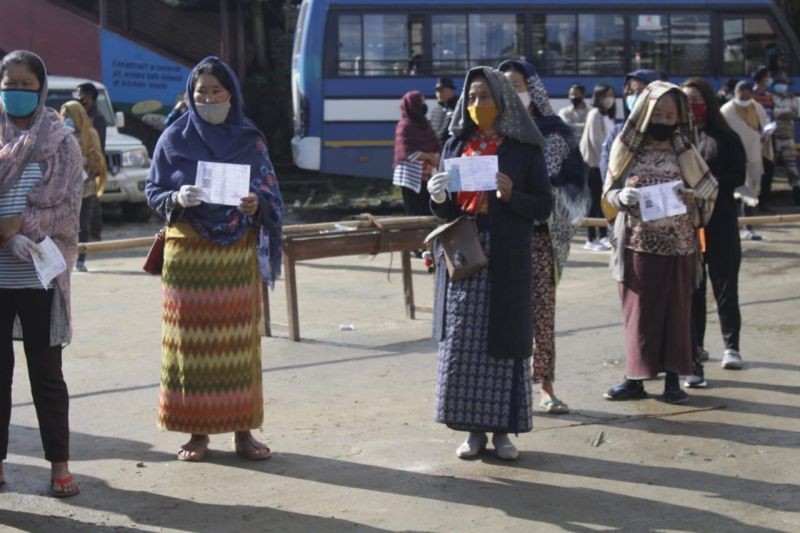Women voters stand in line at a polling station in 14 Southern Angami-I Assembly Constituency on November 3. (Morung Photo: For representational purpose only)

Ketholeno Neihu
Kohima | November 4
The bye-election to the two assembly constituencies in Nagaland on November 3 recorded an overall high poll percentage of 88.10% as compared to other years and as per the Election Commission's assessment, it was "by and large peaceful" and incidents, collectively remained low.
The nexus of proxy voting
However, the astounding turnout still point towards proxy-voting; collective voting in solidarity to a consensus candidate or material incentives accepted during campaigns. With power dynamics playing an influential role, these instances remain unheeded.
One person at Vikhozou Kigwema polling station said he had cast four votes for a candidate ‘trouble-free’. The presiding officers however were reportedly without contention since the polling station was ‘dominated’ by the said candidate’s supporters. In another incident at a khel in Kohima, members had to call off the polling for few hours to deliberate on the khel's standing resolution on proxy voting where few people had tried boycotting. "Within the periphery, collective voting is justified and should not welcome argument," an elder said signaling to continue proxy voting.
Similarly, a student leader in Jakhama village raised concerns over the legality of a star campaigner visiting the polling area which ‘would influence malpractices and disturb peace among electorates’.
Dual votership
As pointed out by Jelle JP Wouters and Roderick Wijunamai in the paper, ‘The cultural politics of proxy voting in Nagaland’, "The obvious answer to Nagaland’s astoundingly high voter turnout is the widespread casting of proxy-votes, or a general perversion of the elevated democratic principle of ‘one person, one vote’ with non-voters, the dead, migrated, and non-existent being voted for.”
As such, a lot of people with dual residence in Nagaland also attest to having two voter cards- synchronously in the area of residence, or the ancestral village where the voter is a rare visitor or vice versa.
So during elections, considering ‘every vote counts’, the maximum utilization of votes of the clan members is rampant without any objection registered by the villagers.
In an area in 14 Southern Angami-I AC, house numbers and names of voters who belonged to the village but permanently resided in Kohima town were listed. They, however, did not have an actual house in the village.
When contacted, the Booth Level Officer (BLO) said house numbers can be duplicated since no officer from higher authority come for verification. "As submission is made, it is duly enrolled without question," the BLO who also belongs to the locality admitted. He also said that while Aadhaar cards are submitted as identity proof, it is not compulsory. This also suggests towards unchecked proxy voting.
Prior to the ensuing bye-elections in two constituencies, Lantsu has arrived at Kiphire to cast his vote. As a third time voter, it was his first time to vote here in his hometown. During the last two elections, he had cast his vote in the state capital where he has been residing since childhood. Another person said his vote was important this time because his uncle is a candidate.
For Zasino, voting in the town constituency in the morning hours and going the village later in the day for the second vote is ‘quite normal’, and she has been doing so for the past elections.
In essence, the number of voters enrolled in the state is high when c ompared to the total number of population. The number of eligible voters as per the 2018 draft rolls is 11,63,388 against a population of 20 lakh as per the 2011 census.
The Nagaland Baptist Churches Council (NBCC) in its advocacy for clean elections called to maintain decency emphasizing that "one vote cast in all honesty can make a big difference."
However, cultural politics mingled with practices of corruption, violence, buying and selling of votes, remain a part of election till date.






